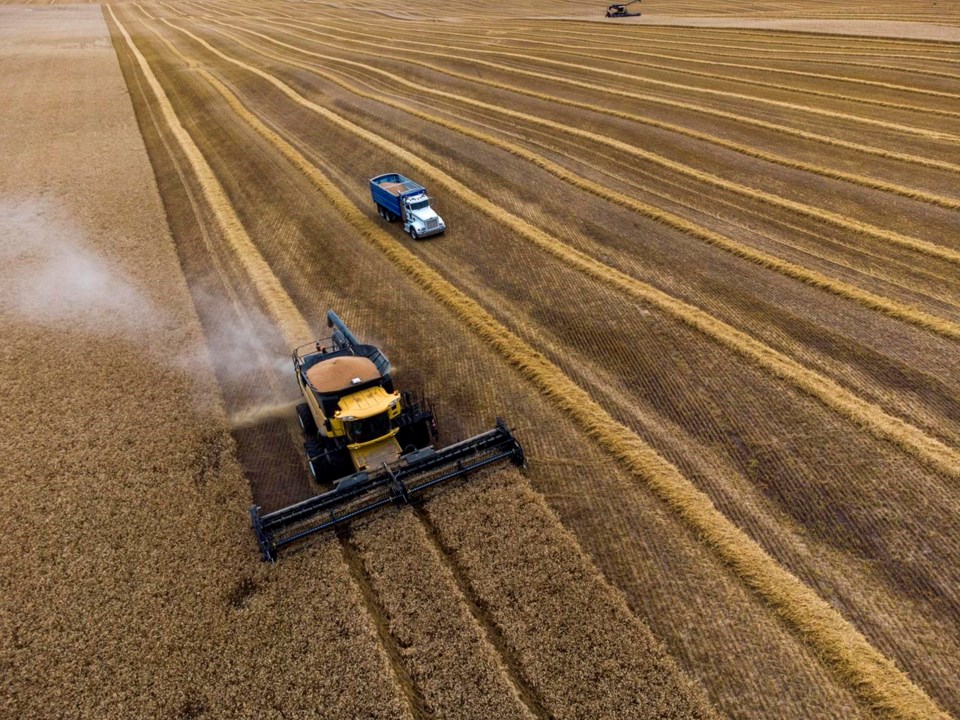CALGARY ŌĆö More than three dozen major water users in southern Alberta have agreed to voluntarily curb their consumption if there's a severe drought this spring or summer, but critics warn the deals won't do enough to address the issue. ┬Ā
The province announced Friday that municipalities, irrigation districts and industry players have signed memorandums of understanding covering four sub-basins: the Red Deer River, the Bow River, the mainstem of the Oldman River and upper tributaries of the Oldman.
The deals are billed as the biggest of their kind in Alberta's history and dwarf ones inked during the 2001 drought.┬Ā
"These agreements, they didn't come together overnight," Rebecca Schulz, the provincial environment minister, told a news conference Friday.
"They represent countless hours of negotiation, compromises and a shared belief that Albertans are better off working together in a potential time of water scarcity."
Schulz said, in general, municipalities have agreed to cut their water use by between five and 10 per cent if needed ŌĆö targets that wouldn't affect indoor water consumption. Some have already begun to do so proactively, she added.┬Ā
Industries have agreed to use the smallest amount needed to operate safely and responsibly. Irrigation districts have agreed to allow other users to get first crack, then keep the rest for licensed use.┬Ā
Schulz said it won't be known whether the agreements need to be acted upon until snowpack data comes in later this month. Water amounts are to be updated every two weeks starting in May.┬Ā
The 38 licensees that signed the deals cover 90 per cent of the water allocated in the Bow and Oldman basins and 70 per cent in the Red Deer River basin.┬Ā
Farmers have had to make tough decisions about which crops to allocate water to, said Alex Ostrop with the Alberta Irrigation Districts Association.┬Ā
Ostrop farms near Taber, Alta., and said the water allocation in his area this year is about half of what it would normally be.
"But irrigation farmers are a resilient bunch, and they've learned to adapt, and this is not the first time that we have faced water shortages," he told the news conference.┬Ā
Some farmers are focusing their water resources on high-value crops, like potatoes and sugar beets, as opposed to trying to boost grain yields, Ostrop added.
Randy Taylor, reeve for the County of Warner, said it's key that everyone works together.┬Ā
"The old adage that, 'We are just a drop in the bucket so it doesn't matter,' doesn't work anymore. Irrigation districts are voluntarily dropping their water, and that is food production," said Taylor.┬Ā
"So we have to be on board as municipalities to save every drop we can. Every little drop makes the big difference in the end."
The text of the memorandums of understanding note they are not legally binding, nor do they serve as a "regulatory instrument of the Water Act" or "amend the terms of any underlying Water Act licences."
Those are some of the reasons the agreements are "a bit of a joke," Nigel Bankes, a professor emeritus in the University of Calgary's law faculty, wrote on the social media platform X, formerly Twitter.┬Ā
"And as yet I'm not seeing anything that addresses instream flows or the importance of maintaining ecological function," he wrote.┬Ā
"These non-agreements are Band-Aids without any glue."
The Alberta Wilderness Association wants the province to declare a Stage 5 emergency under the Water Act, which would give it more power to restrict water use and protect ecosystems.
"Instead, it seems that the (Alberta government) is content to rely upon the goodwill of licensed users through non-binding agreements that they may enter or exit at any time," the group said in a release.┬Ā
Stage 5 is the highest on its water management scale, and the province now sits at Stage 4.
Environmental Defence said the Alberta government hasn't addressed the root cause of the drought: human-caused climate change.┬Ā
"Trying to solve a problem like a multi-year drought without discussing its cause and the factors aggravating the situation is irresponsible and ineffective," Stephen Legault, a senior manager with the group, said in a news release.┬Ā
"It would be like trying to stop a runaway car while ignoring the foot on the accelerator."
This report by The 91įŁ┤┤ Press was first published April 19, 2024. ┬Ā
Lauren Krugel, The 91įŁ┤┤ Press



